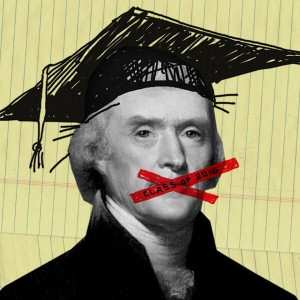 Every April the Virginia-based Thomas Jefferson Center for the Protection of Free Expression bestows its Muzzle Awards, dishonoring “those individuals and institutions responsible for the more egregious or ridiculous affronts to free speech during the preceding year.” In a departure from past years, the Center announced yesterday that the 2016 Muzzles went to 50 colleges and universities grouped into five broad categories of offenses against free expression.
Every April the Virginia-based Thomas Jefferson Center for the Protection of Free Expression bestows its Muzzle Awards, dishonoring “those individuals and institutions responsible for the more egregious or ridiculous affronts to free speech during the preceding year.” In a departure from past years, the Center announced yesterday that the 2016 Muzzles went to 50 colleges and universities grouped into five broad categories of offenses against free expression.
In its introduction to the list, the Jefferson Center hearkened back to the Free Speech Movement, which spread from the University of California-Berkeley to other campuses across the country in the 1960s. Students who demonstrated on issues ranging from the Vietnam War to Civil Rights understood “that intellectual inquiry requires an environment in which debate is uninhibited, robust, and wide-open, even if it occasionally results in unpleasant or offensive exchanges.”
In recent years, though, the Jefferson Center fears that the tide has turned:
Students who once protested to have their voices heard now seek to silence those they disagree with or find threatening. Meanwhile, university administrators appear locked in a competition to determine which school will take the toughest stand against offensive, unpopular, and hurtful speech. First Amendment principles have given way to identity politics, trigger warnings, and so-called “safe spaces,” and the Free Speech Movement has, at many colleges, become the Anti-Speech Movement.
The 2016 Muzzles are divided into the following categories, with a few key examples from each. Check out the Muzzles website for more in-depth analysis and links to coverage of campus censorship around the country.
Big Brother is Watching: Censorship of Students
- The University of Oklahoma, which expelled two students and banned the Sigma Alpha Epsilon fraternity after members were filmed singing a racist song.
- Texas Christian University, which reprimanded student Harry Vincent for posts on his personal social media accounts that offended non-affiliates of the university. Vincent was placed on academic probation for the remainder of his time at the university and required to complete 60 hours of community service.
- The University of Tulsa, which banned student George “Trey” Barnett from campus for Facebook posts written not by him, but by his husband Chris Mangum, a non-student. Mangum had “criticized two TU theater professors and made disparaging remarks about the physical appearance of one of Barnett’s classmates.” Furthermore, university administrators also threatened to discipline editors of the student newspaper if they continued to report on the issue.
Introduction to Irony: Censorship by Students
- Yale University, where instructor Erika Christakis was hounded off campus after she wrote a nuanced email critiquing university-issued guidelines about cultural appropriation in Halloween costumes.
- Duke University, where a group of student protesters demanded “loss of employment for any Duke employee whose speech threatened the safety or potential academic success of students of color.”
- Amherst College, where student protesters claimed that “the movement . . . by no means intends to stifle free speech,” but then demanded sanctions against anonymous students who had posted signs around campus that read “All Lives Matter” and “Free Speech.”
Evading the Fourth Estate: Efforts to Limit Press Access on Campus
- The University of Missouri, where assistant professor Melissa Click gained nationwide notoriety when she attempted to bar a student photographer from covering a demonstration. Click was later relieved of her job by the university’s board of curators.
- Smith College, where student activists tried to limit press coverage of their demonstrations to “only those journalists who agreed in advance to explicitly support the movement in their articles.”
Censorship in the Classroom: Threats to Academic Freedom
- Louisiana State University, where the administration fired education professor Teresa Buchanan, despite a faculty committee’s recommendation that she be retained. After nearly 20 years at the university, Buchanan was reported by one student for occasionally using profanity and jokes of a sexual nature in her lectures.
- Northwestern University, where administrators at the Feinberg School of Medicine “censored a faculty-produced bioethics journal based on the content of one issue and demanded that all future articles be reviewed by the administration prior to publication.” The journal’s “Bad Girls” issue featured an essay by a paralyzed Syracuse University professor about a sexual relationship he had with a nurse who was treating him many years ago. Medical school administrators were allegedly concerned that the issue “might hurt the Northwestern ‘brand’ and that of the corporation that oversaw the university hospital system.”
Seminar in Ideological Gerrymandering: Censorship of Outside Speakers
The Jefferson Center notes that speakers were targeted for censorship across the political spectrum, and each case “served to diminish free speech principles on their respective campuses.” Targeted speakers included:
- Illinois governor Bruce Rauner at Southern Illinois University-Carbondale
- Texas governor Greg Abbott at the University of North Texas
- Anti-feminist writer Suzanne Venker at Williams College
- Rapper Common at Kean University
- Angela Davis at Texas Tech University
- Cornel West at UCLA
- Ben Carson at Alma College
Help support CBLDF’s important First Amendment work in 2016 by visiting the Rewards Zone, making a donation, or becoming a member of CBLDF!
Contributing Editor Maren Williams is a reference librarian who enjoys free speech and rescue dogs.